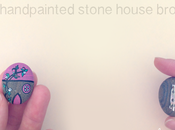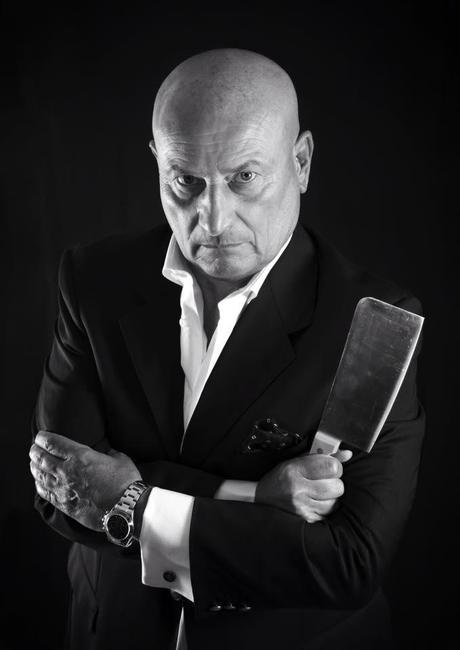
scroll down for english version
Si definisce un “italian gourmand”, é autore di un libro esilarante ed indispensabile, una lettura obbligatoria per tutti quei viaggiatori italiani con il vizio della pasta sempre ovunque e comunque: “Fettuccine Alfredo, Spaghetti Bolognaise & Caesar Salad: The Triumph of the World’s False Italian Cuisine” dove racconta come l’immaginario straniero abbia spesso stravolto la nostra tadizione gastronomica sino a proporre dei classici come gli spaghetti alla bolognese in versioni che definire creative sarebbe riduttivo.
Lui è Maurizio Pelli, è private chef e grande esperto di cucina italiana, lo potete ritrovare anche nella sua irresistibile pagina Facebook The Culinary Clinic.
Vive a Dubai per la maggior parte dell’anno, ed è molto spesso assalito dal dubbio se è meglio la piscina scoperta a 29 gradi o il tepore da sauna di quella coperta con i mosaici dorati a 33 gradi.
E adesso gli lasciamo la parola.
GFT&L: Abbiamo una domanda di rito per tutti i nostri intervistati: Chi è Maurizio Pelli?
MP: Sono un ex uomo d’affari ritirato a Dubai dal 1999.
Ho sempre cucinato e da sempre ho avuto una forte attrazione per la buona tavola. Anche se avevo poco tempo, non mancavo di passare qualche ora tra i fornelli durante i weekend per organizzare inviti a cena.
Quando mi sono ritirato dagli affari ho avuto a disposizione tempo libero e ho cominciato ha cucinare e a scrivere per hobby, mi sono anche divertito a fare lo chef di un off shore team di un mio ex socio d’affari durante i campionati del mondo di Class One 2001.
Finita l’avventura motonautica, mi è rimasta la voglia di cucinare, e prima ho cucinato per i party di amici, ovviamente senza ritorno economico giusto per piacere!
Finché un bel giorno mi arrivò una richiesta telefonica che mi chiedeva un servizio professionale di chef, probabilmente il cliente era un qualche ospite di uno dei Dinner Party organizzati per gli amici.
In quel momento divenni Private Chef.
GFT&L: Private chef?
MP: Si, perchè la definzione Personal chef, in inglese, è di chi si ocupa della gestione della cucina e della tavola di una sola persona o famiglia. E’ per l’appunto lo chef personale di qualcuno.
Il private chef, invece, è sostanzialmente un imprenditore che organiza cene ed eventi gastronomici per diversi committenti. In base alla richiesta del cliente si potrebbe occupare di tutto, dagli aperitivi alla musica. Ovviamente la cucina è il business principale.
GFT&L: Perché Dubai? Che tipo di societá é quella in cui si muove un private chef e un conoscitore della gastronomía italiana con la tua esperienza?
MP: La scelta di Dubai non è stata casuale, avevo già qualche interesse economico prima ancora di approdarci definitivamente.
15 anni fa, il panorama della cucina italiana e delle reperibilità dei prodotti Enogastronomici italiani era completamente diverso da oggi. Dubai è in continua irrefrenabile espansione ed evoluzione, allora si trovava solo qualche ristorante italiano o meglio rigorosamente falso/italiano, motivo che in seguito mi spingerà a scrivere il libro “Fettuccine Alfredo, Spaghetti Bolognaise & Caesar Salad: The Triumph of the World’s False Italian Cuisine ‘, e poca scelta di prodotti italiani, e solo quelli tra i più commerciali sul mercato.
Allora non era necessaria una grande esperienza, bastava sapersela cavare con quel poco che c’era a disposizione, e si trovava giusto l’essenziale, poi con il passare degli anni è stato un crescendo di importazioni di prodotti sempre più ricercati e di miglior qualità, oggi è necessario avere una conoscenza gastronomica più sofisticata, mentre anni fa, il problema principale di un private chef era sostanzialmente la reperibilità degli ingredienti l’essenziali per cucinare italiano.
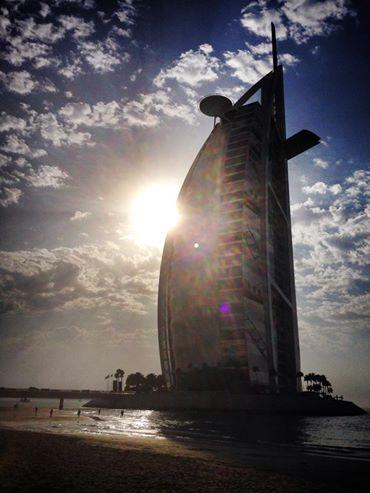
GFT&L: Cosa vuol dire essere un personal chef a Dubai e che cosa fai esattamente?
MP: Essere un private chef a Dubai è abbastanza complicato.
Sono presenti più di 280 nazionalità diverse, diverse mentalità, usi e costumi e soprattutto gusti.
A volte ho in tavola 6-7 nazionalità diverse per ogni cena.
In più la totale ignoranza della vera cucina italiana da parte dei clienti certamente non aiuta.
Abituati al gusto ‘falso italiano’ della maggior parte dei ristoranti diventa ardua impresa proporre un serio menù italiano.
Ovviamente sono privilegiato dal fatto che non sono obbligato da necessità economiche a scendere a compromessi, quindi propongo io i menù e non cucino niente che non sia rigorosamente italiano.
Un’ altra selezione la fa il prezzo base di una cena, che è a partire da 110 euro a testa, vini esclusi. Per poi salire in base a quello che desiderano mangiare ed ai servizi che vogliono avere durante la cena come:
Sommelier americana diplomata a Londra specializzata in vini italiani
Servizio fotografico
Barman
Camerieri provenienti da hotel stellati
Piano mezzo coda consegnato a domicilio e pianista & violinista.
La maggior parte dei clienti non sono locali o arabi, ma in genere espatriati europei, australiani, americani neozelandesi, eccettera, quindi non c’è nessuna restrizione per alcool o maiale
Il maiale o altri ingredienti proibiti per l’islam, si trovano senza nessun problema in supermercati specializzati, dove all’interno sono ricavati spazi isolati dal resto ed accessibili solo ai non mussulmani.
Le poche volte che si presentano queste restrizioni alimentari dovute a motivi religiosi, propongo un menù di pesce e sfumo le pietanze con non alcoholic wine.
GFT&L: Che tipo di cucina italiana si può proporre a Dubai?
MP: La mia cucina è italiana, basata sui piatti della tradizione, e praticamente cucino all’italiana con ingredienti francesi, che sono maggiormente disponibili, ovvero faccio il contratto di quanto fa la cucina internazionale che utilizza tecnica francese con i prodotti italiani.
Il problema più grande a Dubai è, infatti, trovare le materia prime, e gestire lo stoccaggio in modo più efficiente. A volte ci si impiegano giornate intere a trovare un prodotto, dato che la losgistica è arbitraria, ci sono pochissimi importatori, ad esempio ce ne è uno solo per la pasta. Il prodotto fresco è difficile da trovare e bisogna fare costanti visite agli organic shops e ai supermercati.
Qui nasce la sfida: la vera cucina italiana è una cucina di ingredienti eccellenti, basta pensare a un ristorante come Don Alfonso che ha il suo orto.
La cucina che io propongo è opposta alle tendenze di sofisticazione eccessiva della cucina internazionale. Propongo i piatti nella loro vera essenza, ad esempio un risotto è resta un risotto, cremoso e steso nel piatto, e non lo presenterei mai come un tortino o una torre.
Non uso nessun artificio di cucina molecolare, ma attingo alla grande tradizione regionale.
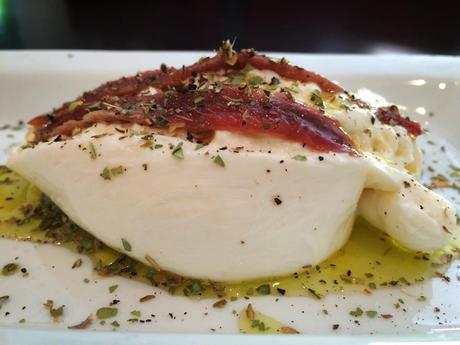
GFT&L: Noi italiani siamo capaci di parlare e di diffondere la nostra tradizione
MP: In Italia non sappiamo assolutamente diffondere ed esportare la nostra cultura culinaria. Abbiamo prodotti di alta qualità, ma non abbiamo un piano per far conoscere questi prodotti, nè una scuola di tecniche e di diffusione dei sapori come avevano e hanno i francesi.
Loro esportano bene i prodotti, hanno un sistema compatto del marchio Francia legato alla cucina, mentre da noi c’è una competitività elevata tra i singoli produttori che alla fine danneggia il comparto nel suo insieme.
Non è ammissibile che un prodotto come il Culatello di Parma sia meno famoso all’estero del prosciutto Pata Negra spagnolo.
La stessa cosa succede con i vini, i francesi vincono sempre la gara, e sono spesso meno buoni e più cari.
GFT&L: Cosa ti ha spinto a scrivere un libro come “Fettuccine Alfredo, Spaghetti Bolognaise & Caesar Salad: The Triumph of the World’s False Italian Cuisine” ?
MP: Una delle conseguenze della nostra incapacità di promuovere ed esportare la nostra cultura gastronomica è che si sono imposte le assurde travisazioni della cucina italiana che ho descritto nel mio libro. Partendo dalle fettuccine Alfredo che, a parte i padroni del ristorante Alfredo di Roma, nessuno nel nostro Paese conosce e che sono un icona della cucina italiana negli USA.
La richiesta dei clienti si identifica talmente tanto con le interpretazioni bizzarre della cucina italiana, che spesso per riuscire ad avere una redditività economica molti cuochi italiani all’estero scendono a compromessi, tradendo la grande tradizione italiana che è a sua volta si origina dalla grande complessità e varietà della cucina regionale.
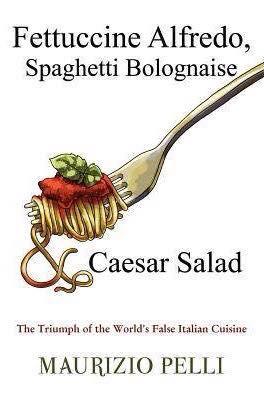
GFT&L: Esiste ancora il fascino dell’ “Italian Style” come in anni passati?
MP: La visione che arriva dell’Italia dall’estero è ancora positiva, ma si avverte una certa decadenza anche in ambito gastronomico.
O meglio, in generale, è la qualità media che sta decandendo, mentre emergono le grandi eccellenze, i grandi chef con relativi prezzi altissimi.
I ristoranti di medio livello stanno limitando ingredienti di prima qualità che rendono il piatto finale caro. Questo avviene anche al supermercato, gli ingredienti migliori sono sempre più cari.
La sensazione è che si stia creando una netta separazione tra ricchi e poveri anche in cucina, e la cucina, si sa, rispecchia grandemente lo stato di benessere di una nazione.
GFT&L: Tra le attività di diffusione della vera cucina italiana hai quella di Summit Advisor per l’Italian World Cuisine Summit a Dubai, spiegaci meglio di cosa si tratta.
MP: Sono advisor per l’Italian Cuisine World Summit che per il secondo anno si terrà a Dubai.
E’ uno degli eventi più importante per la promozione della cucina italiana di qualità.
Si svolgerà dal 7 al 20 novembre e Dubai in quei giorni sarà la capitale mondiale della cucina e dello stile di vita italiano al di fuori d’Italia.
Il Summit è ideato da Food and travel comunications ed promosso in collaborazione con i migliori ristoranti italiani a Dubai e itchefs-GVCI.com, un network di oltre 2500 cuochi e professionisti culinari che lavorano in 70 paesi in tutto il mondo.
Ci sarà la presenza di tanti cuochi stellati italiani e si delineranno le tendenze future della cucina italiana.
E’ un evento ricchissimo di iniziative, eventi, corsi di formazione sulla cucina italiana, la sua tradizione e anche la sua evoluzione nel rispetto di questa grande tradizione che vuol dire anche rispetto per gli ingredienti e dei produttori.
Consiglio tutti di dare un’occhiata al programma e alle iniziative perchè è uno dei pochi veri momenti di diffusione della cucina italiana di alto livello fatto da italiani all’estero .
Chi si ocupa di cucina italiana dovrebbe venire a Dubai ad assistere al summit.
GFT&L: Cosa consiglieresti a un giovane che volesse intraprendere la carriera di private chef?
MP: Il consiglio principale è di incontrare una proposta personale, un suo percorso autentico, senza scopiazzare di qua e di là.
Bisognerebbe avere la forza di non farsi influenzare troppo dalle richieste dei clienti, e questa è la parte più difficile
In una prima fase non concentrarsi sui guadagni, ma a costruire una solida professionalità e un propria personalità. Deve cucinare quello che a lui o lei piace.
Solo in una seconda fase potrà imporre i suoi prezzi.
GFT&L: Come si gestiscono le esigenze di cucina senza glutine per i celiaci o i sensibili al glutine.
MP: Anche a Dubai l’esigenza di un menú gluten free sta venendo a galla. Nel caso di un buffet non ci sarebbero molti problemi, ci sarebbero comunque piatti naturalmente senza glutine che si possono farcilmente tenere separati per evitare contaminazioni e ci sono tantissime ricette di riso da proporre.
Nel caso di cene e cenoni invece la situazione è più complicata, innanzi tutto perchè le cucine dell’anfitrione possono essere contaminate da glutine ed è difficile intervenire, in secondo luogo i costi aumentano perchè bisognerebbe praticamente gestire una brigara di cucina a parte.
GFT&L: A quanto il prossimo libro?
MP: Quando non so, per ora ci sarà la riedizione del mio primo libro, che non è ancota pubblicato in italiano.
Il secondo sarà dedicato alla cucina di bordo, la cucina degli yacht: ovvero come mangiare bene anche in alto mare e l’argomento sarà il divario presente tra la grande qualità di vini e champagne rispetto alla pessima qualità della cucina.. Come spesso accade nella realtà ..! Come nel primo libro una breve analisi, usi, costumi e conseguenze di una cucina spesso bistrattata per diversi motivo che spiegherò .
Grazie Maurizio, e allora a propósito di mare, speriamo di incontrarci una volta da qualche parte tra mediterraneo e golfo arabo…
PS: le foto sono di Maurizio Pelli
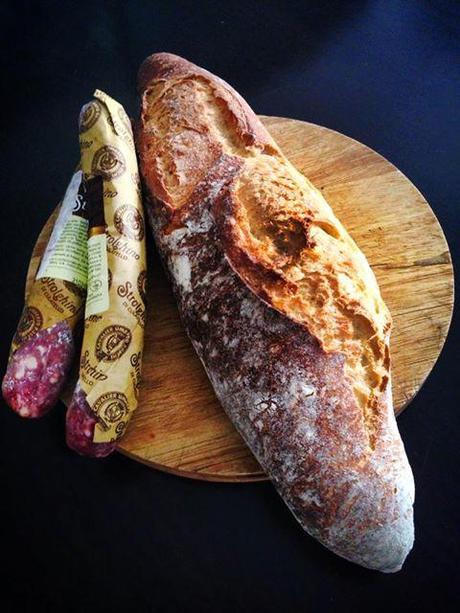
Today we know Maurizio Pelli
He calls himself an “Italian gourmand”, is the author of a book exhilarating and indispensable, a must read for all those Italian travelers, pasta addicted anywhere and everywhere: “Fettuccine Alfredo, Spaghetti Bolognaise & Caesar Salad: The Triumph of the World’s True Italian Cuisine” which tells how the foreigners imaginary has often changed our Italian classic gastronomic tradition into dishes such as spaghetti Bolognese in versions that defining “creative” would be an understatement.
He is Maurizio Pelli, is a private chef and expert in Italian food, he can also be found in his compelling Facebook page The Culinary Clinic,
He lives in Dubai for most of the year, and is very often assailed by doubts whether it is better the outdoor pool at 29 degrees or the warmth of the sauna covered with golden mosaics at 33 degrees.
And now we leave him the word.
GFT & L: We have a ritual question for all of our interviewees: Who is Maurice Pelli?
MP: I am a former businessman retired in Dubai since 1999.
I’ve always cooked and I have always had a strong attraction for good food. Although I had little time, I did not fail to spend a few hours in the kitchen on weekends to prepare dinner invitations.
When I retired from the business I had spare time and I have started to cook and write as a hobby, I also enjoyed to be the chef of the offshore team of one of my former business partner during the world championships in Class One 2001.
After this boating adventure, my desire to cook was still intact, and I cooked for the party of friends with no economic return, of course, just for pleasure!
Until one fine day, I got a call asking me a professional catering service the customer probably was a guest of one of the few Dinner Party organized by some friend of mine
At that moment, I became a Private Chef.
GFT & L: Private chef?
MP: Yes, because the definition of Personal chefs, in English, is the person who is in charge of the kitchen management of one person or family. It is precisely the personal chef to someone.
The private chef, on the other hand, is basically an entrepreneur who organizes dinners and gastronomic events for different clients. Depending on the customer’s request, we could deal with everything from appetizers to music. Of course, the cuisine is the main business.
GFT & L: Why Dubai? What kind of society is one in which you move as a private chef and a connoisseur of Italian cuisine stands with your experience?
MP: The choice of Dubai was no accident, I had some economic interest here even before moving permanently.
15 years ago, the landscape of Italian cuisine and Italian Wine and food availability of the products was completely different from today. Dubai is continually in unbridled expansion and evolution, at that time there were only a few Italian restaurants or, better said, false Italian, and that was the reason that push me to write the book “Fettuccine Alfredo, Spaghetti Bolognaise & Caesar Salad: The Triumph of the World’s False English Cuisine ‘. When I came to Dubai there was a little choice of Italian products and only those very popular and commercial brands.
So it was a great experience, it was sufficient to know how to deal with what there was available, and it was just the essentials, then over the years has been a growing imports of increasingly sophisticated and better quality, it is now necessary to have a more sophisticated culinary knowledge, years ago, the main problem of a private chef was substantially the availability of the essential ingredients for cooking Italian.
GFT & L: What does it mean to be a personal chef in Dubai and what do you do exactly?
MP: Being a private chef in Dubai is quite complicated.
There are more than 280 different nationalities, different mentalities, customs and, above all, tastes.
Sometimes I have 6-7 different nationalities at the table for every meal.
In addition, the total ignorance of the true Italian cuisine from customers certainly does not help.
They Get used to the taste ‘fake Italian cuisine’ of most of the restaurants, so become an arduous task to propose a serious Italian menu.
Of course, I have the privilege to not to be compelled by economic needs and so I can avoid any compromise, then I propose menus and I do not cook anything that is not strictly Italian.
Another selection is the price of a dinner, which is from 110 euro per person, excluding wine. It can be more expensive based on what they want to eat and services that they want to have as:
American Sommelier with a diploma in London specialized in Italian wines
photo shoot
bartender
Waiters from starred hotels
Grand Piano and pianist and violinist.
Most customers are not local or Arab, but generally expatriate Europeans, Australians, New Zealanders Americans, etcetera, so there is no restriction on alcohol or pork
The pork or other ingredients prohibited by Islam are available in specialized supermarkets, where there are areas within isolated from the other products and accessible only to non-Muslims.
The few times we have these dietary restrictions due to religious reasons, I propose a menu of fish and I use non-alcoholic wine to cook.
GFT & L: What kind of Italian food you can offer in Dubai?
MP: My Italian cuisine is based on traditional dishes, and I pretty much cook Italian with French ingredients, which are more easily available, I do the contrary of the international cuisine does, using French technique with Italian products.
The biggest problem in Dubai is, in fact, find the raw materials, and manage the storage efficiently. Sometimes we employ all day to find a product, since the logistics are arbitrary, there are very few importers, for example, there is only one for the pasta. The fresh produce is hard to find and you have to make constant visits to the organic shops and supermarkets.
Here comes the challenge: the true Italian cuisine is a cuisine of excellent ingredients, just think of a restaurant like Don Alfonso, who has his own vegetable garden.
The kitchen that I propose is the opposite to the trends of excessive sophistication of international cuisine. I propose the dishes in their true essence, such as a risotto is still a risotto, creamy and spread on the plate, and I do not ever would make it as a pie or a tower.
I do not use any artificial molecular cuisine, but I propose the great tradition of the Italian regions.
GFT & L: We Italians are able to communicate and spread our food tradition
MP: In Italy, we have no idea how spread and export our culinary culture. We have high-quality products, but we do not have a plan to introduce these products, nor a school of techniques and dissemination of flavors as they have the French.
They know how to export their products well, they have a strong France brand tied to the kitchen, while in Italy there is a high competition among the individual producers that eventually damages the sector as a whole.
It is unacceptable that a product like Culatello of Parma is less well-known abroad then the Spanish Pata Negra ham.
The same thing happens with wine, the French wines always win the race but are often less good and more expensive.
GFT & L: What inspired you to write a book like “Fettuccine Alfredo, Spaghetti Bolognaise & Caesar Salad: The Triumph of the World’s False Italian Cuisine”?
MP: One of the consequences of our failure to promote and export our food culture is that there are absurd misrepresentations of Italian cooking that I described in my book. Starting with fettuccine Alfredo that, apart from the owners of the restaurant Alfredo of Rome, no one in our country knows, but they are an icon of Italian cuisine in the US.
The customer demand is identified so much with the bizarre interpretations of Italian cuisine that often to get an economic return many Italian chefs abroad accept compromises, betraying the great Italian tradition which arises from the complexity and variety of regional cuisine.
GFT & L: Is there still the charm of ” Italian Style “as in years past?
MP: The vision that comes from outside of Italy is still positive, but there is a certain decline in the food sector.
In general, the average quality is lowering while is emerging the excellence and the chefs with their high prices.
The restaurants are limiting mid-level-quality ingredients that make the final dish expensive. This also happens at the supermarket, the best ingredients are always more and more expensive.
The feeling is that there is going to be a clear separation between rich and poor also in the kitchen, and the food, you know, greatly reflects the well-being of a nation.
GFT & L: With the objective to promote the true Italian cooking you are advisor to Italian Cuisine World Summit in Dubai, explain us better what it is.
MP: I am advisor to the Italian Cuisine World Summit that for the second year will be held in Dubai.
It is one of the most important events for the promotion of the Italian cuisine.
It will take place November 7 to 20, in those days Dubai will be the world capital of Italian food and way of life outside of Italy.
The Summit is designed by the Food and travel communications and promoted in collaboration with the best Italian restaurants in Dubai and itchefs-GVCI.com, a network of more than 2,500 chefs and culinary professionals working in 70 countries around the world.
There will be the presence of so many starred chefs Italian and they will design the future trends in Italian cuisine.
It is an event full of activities, show cooking, dinner, training courses on Italian cuisine, its tradition and its evolution in the path of this great food culture that also means respect for the ingredients and producers.
I would recommend everyone to take a look at the program and initiatives because it is one of the few true moments of promotion of high-quality Italian cuisine made abroad.
Everybody who is concerned about Italian cuisine should come to Dubai to attend the summit.
GFT & L: What would you recommend to a young man who wanted to pursue a career as a private chef?
MP: The main advice is to have with a personal proposal, to find his true path, to not be plagiarized from anything.
He or she should have the strength not to be influenced too much by the demands of customers, and this is the hardest part.
In the first stage do not focus on earnings, but to build a strong professionalism and his personality. It has to cook what he or she likes.
Only in a second phase he-she could impose the prices.
GFT & L: How do you handle the needs of gluten-free cooking for celiac or gluten sensitive.
MP: Even in Dubai the need for a gluten free menu is coming to the surface. In the case of a buffet there would not be any problems, there would be gluten-free dishes that can be easily kept separate to avoid contamination and there are many rice recipes to offer.
In the case of a dinners, the situation is more complicated, first because the host’s kitchen can be contaminated with gluten and it is difficult to intervene, secondly the costs increase because we should pretty much manage a brigade kitchen apart.
GFT & L: When will be ready the next book ?
MP: When I do not know, for now there will be a new edition of my first book, which is not yet published in Italian.
The second book will be about yacht cooking : how to eat well on the high seas and the topic will be the gap between the high quality of wines and champagnes with respect to the poor quality of the cuisine . As often happens actually ..! As in the first book, I made an analysis, and I describe uses, customs and consequences of a kitchen often mistreated for several reasons which I will explain.
Thanks, Maurizio, and speaking of sea, I hope we will meet somewhere between the Mediterranean and the Arabian Gulf …




